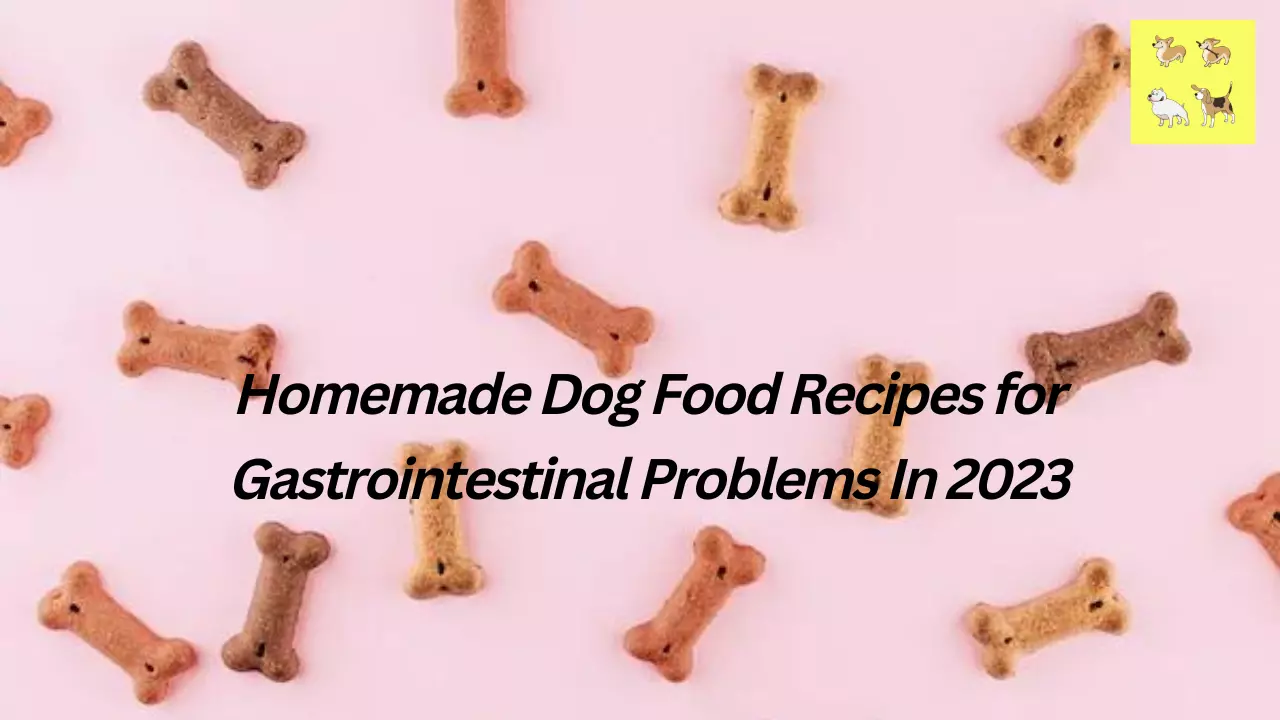Homemade dog food can be a great option for dogs with gastrointestinal issues.
Many commercial dog foods contain ingredients that can cause digestive problems, such as preservatives, artificial colors, and flavors, grains, and fillers.
By making their own dog food, pet owners can control the ingredients and ensure their furry friends get a nutritious, easy-to-digest meal.
There are different recipes for homemade dog food for digestive problems.
Some common ingredients include lean meats, like chicken or turkey, and easily digestible starches, like brown rice or sweet potatoes.
Other ingredients that may benefit dogs with digestive issues include pumpkin, which can help regulate bowel movements, and probiotics, which can support healthy gut bacteria.
It’s important to note that homemade dog food should always be nutritionally balanced and meet your dog’s specific dietary needs.
Pet owners should consult their veterinarian before making any changes to their dog’s diet.
Understanding gastrointestinal problems in dogs
Gastrointestinal problems in dogs can be caused by many factors, including food allergies, infections, intestinal parasites, and underlying health conditions.
Symptoms of gastrointestinal problems can include vomiting, diarrhea, constipation, and loss of appetite.
When dogs have gastrointestinal issues, it’s important to give them food that’s easy to digest and gentle on their stomachs.
Homemade dog food recipes for gastrointestinal issues can be a great option for dogs with digestive issues.
There are a variety of homemade dog food recipes for gastrointestinal issues, including those for sensitive stomachs, digestive problems, and upset stomachs.
These recipes are designed to be easy to digest and often include ingredients that are gentle on the stomach.
When choosing a homemade dog food formula to address gastrointestinal issues, it is important to choose a formula that is nutritionally balanced and meets your dog’s dietary needs.
Consult your veterinarian or veterinary nutritionist to ensure that the formula you choose is right for your dog’s specific needs.
Some common ingredients used in homemade dog recipes to treat gastrointestinal problems include:
Along with providing your dog with easy-to-digest homemade food, it’s also important to ensure that they always have access to clean water.
Dehydration can worsen gastrointestinal problems, so it’s important to encourage your dog to drink plenty of water.
Overall, homemade dog food recipes for dogs with gastrointestinal problems can be a great option for dogs with digestive problems.
By choosing a nutritionally balanced and easily digestible formula, you can help support your dog’s gastrointestinal health and promote overall health.
Also Read
- 5 Best Homemade Dry Shampoo for Itchy Dogs (Step by Step)
- Homemade Dog Shampoo for Itchy Skin In 2023
- Homemade Dog Shampoo for Itchy Skin In 2023
- 5 Easy Homemade Recipes for Dogs with Yeast Infections
Importance of homemade dog food for gastrointestinal problems
Dogs can suffer from a variety of gastrointestinal problems, ranging from mild to severe.
Some of these problems may be caused by food sensitivities, while others may be related to an underlying health condition.
Whatever the cause, it’s important to treat these problems as soon as possible to avoid further complications.
A healthy, balanced diet is one of the best ways to manage gastrointestinal problems in dogs.
Homemade dog food can be a great choice for dogs with sensitive stomachs or digestive issues.
This is because homemade dog food allows you to control the ingredients in your dog’s food, ensuring they get the nutrients they need without any harmful additives or fillers.
When preparing homemade dog food for gastrointestinal problems, it’s important to choose ingredients that are gentle on your dog’s stomach.
This can include lean protein like chicken or turkey, as well as easily digestible carbs like rice or sweet potatoes.
High-fiber foods, such as vegetables and fruits, can also be beneficial for dogs with gastrointestinal issues.
Along with being beneficial for dogs with digestive issues, homemade dog food can also be a great way to promote overall health and well-being.
By providing your dog with a balanced and nutritious diet, you can help them maintain a healthy weight, support their immune system, and reduce their risk of chronic diseases.
Overall, homemade dog food can be a great choice for dogs with gastrointestinal issues.
By carefully selecting ingredients and preparing meals for your dog at home, you can help him feel better and enjoy a better quality of life.
Choosing the Right Ingredients for Homemade Dog Food
When it comes to preparing homemade dog food to cure gastrointestinal problems, choosing the right ingredients is key.
The ingredients you choose will determine the nutritional value of your dog food and may help reduce gastrointestinal problems.
Here are some important factors to consider when choosing ingredients.
Protein
Protein is an essential nutrient for dogs and it should be an important part of their diet.
When choosing protein sources for homemade dog food, choose lean meats like chicken, turkey, and fish.
Avoid fatty cuts of meat, as they can aggravate gastrointestinal problems. It’s also important to note that some dogs may be allergic or sensitive to certain proteins, so be sure to check with your veterinarian.
Carbohydrates
Carbohydrates provide energy and fiber for dogs.
When choosing carbohydrates for homemade dog food, choose complex carbohydrates like brown rice, sweet potatoes, and quinoa.
These carbs are easier to digest for dogs and can help regulate their digestive system.
Avoid simple carbs like white rice and bread as they can cause blood sugar spikes and worsen gastrointestinal problems.
Fat
Fat is an important source of energy for dogs, but choosing the right type of fat is important.
When choosing fats for homemade dog food, choose healthy fats like fish oil and flaxseed oil.
These fats are high in omega-3 fatty acids, which can help reduce inflammation and improve gastrointestinal health.
Avoid unhealthy fats like trans fats and saturated fats, as they can increase the risk of gastrointestinal problems.
Fiber
Fiber is an important nutrient for dogs because it helps regulate their digestive system. When choosing a source of fiber for homemade dog food, choose vegetables like chickpeas, carrots, and peas.
These vegetables are high in fiber and can help relieve gastrointestinal problems. Avoid high-fiber fruits like apples and bananas, as they can cause diarrhea and other gastrointestinal problems.
Choosing the right ingredients to make homemade dog food is essential for dogs with digestive problems.
By choosing lean proteins, complex carbohydrates, healthy fats, and fiber-rich vegetables, you can help ease gastrointestinal issues and improve your dog’s overall health.
As always, consult your veterinarian before making any changes to your dog’s diet.
Homemade Dog Food Recipes for Gastrointestinal Problems
When a dog is experiencing gastrointestinal problems, it can be a challenge to find a suitable diet that won’t further upset their stomach.
Homemade dog food recipes can offer a solution, providing a healthy, nutritious, and easily digestible option for dogs with sensitive stomachs.
Here are three homemade dog food recipes that can help alleviate gastrointestinal problems in dogs:
Chicken and Rice Recipe
This recipe is a classic and simple option that is easy to digest and gentle on the stomach.
The chicken provides protein, while the rice offers a source of carbohydrates. Here’s how to make it:
Ingredients:
- 2 cups cooked brown rice
- 1 pound cooked chicken breast, diced
- 1 cup cooked carrots, chopped
- 1/2 cup cooked green beans, chopped
- 1 tablespoon olive oil
Instructions:
- Combine all ingredients in a large bowl.
- Mix well to ensure all ingredients are evenly distributed.
- Serve in appropriate portions for your dog’s size.
Beef and Sweet Potato Recipe
Beef is a great source of protein for dogs, and sweet potatoes are an excellent source of fiber.
This recipe is also high in vitamins and minerals, making it a nutritious option for dogs with gastrointestinal problems. Here’s how to make it:
Ingredients:
- 2 cups cooked brown rice
- 1 pound cooked ground beef
- 1 cup cooked sweet potatoes, mashed
- 1/2 cup cooked green beans, chopped
- 1 tablespoon olive oil
Instructions:
- Combine all ingredients in a large bowl.
- Mix well to ensure all ingredients are evenly distributed.
- Serve in appropriate portions for your dog’s size.
Turkey and Quinoa Recipe
Turkey is another excellent source of protein for dogs, and quinoa is a gluten-free grain that is easy to digest.
This recipe is also high in vitamins and minerals, making it a nutritious option for dogs with gastrointestinal problems. Here’s how to make it:
Ingredients:
- 2 cups cooked quinoa
- 1 pound cooked ground turkey
- 1 cup cooked carrots, chopped
- 1/2 cup cooked green beans, chopped
- 1 tablespoon olive oil
Instructions:
- Combine all ingredients in a large bowl.
- Mix well to ensure all ingredients are evenly distributed.
- Serve in appropriate portions for your dog’s size.
It’s important to note that every dog is different, and what works for one dog may not work for another.
If your dog has ongoing gastrointestinal problems, it’s best to consult with a veterinarian to determine the best diet for their specific needs.
Tips for feeding homemade dog food to cure digestive problems
Feeding your dog homemade food for gastrointestinal problems requires careful attention to ensure your furry friend receives the nutrition he needs while treating digestive issues.
Here are some essential tips to keep in mind when preparing and feeding homemade dog food to cure gastrointestinal problems.
Consult a veterinarian
Before making any changes to your dog’s diet, it is essential to consult a veterinarian.
They can offer valuable advice based on your dog’s specific gastrointestinal issues, allergies, and dietary requirements.
Your veterinarian will help you determine the ingredients, portions, and feeding schedule that are right for your dog’s unique needs.
Gradually introduce new foods
When transitioning to a homemade diet for gastrointestinal problems, it is important to introduce new foods gradually.
Start by incorporating a small amount of homemade food into your dog’s existing diet and gradually increase the proportion over several days.
This gradual transition allows your dog’s digestive system to adapt and reduces the risk of colic.
Focus on easily digestible ingredients
Choose easily digestible ingredients for dogs with gastrointestinal problems.
Lean proteins like chicken, turkey or fish can provide essential nutrients without putting extra strain on the digestive system.
Incorporate cooked carbs like rice, quinoa, or sweet potatoes, which are easy to digest.
Vegetables like carrots, green beans, and pumpkin can provide fiber and support digestive health.
Avoid common allergens
Some ingredients are known to cause allergies or sensitivities in dogs.
Common allergens include wheat, corn, soy, and milk. If your dog has known allergies or sensitivities, it is important to avoid these ingredients when making homemade food.
Choose hypoallergenic alternatives and monitor your dog’s response to the new diet.
Maintain a balanced diet
Make sure that your homemade dog recipes provide balanced nutrition for your furry friend.
A balanced diet includes a good ratio of protein, carbohydrates, healthy fats, vitamins and minerals.
You can consult with your veterinarian or a veterinary nutritionist to ensure that your homemade recipes meet your dog’s nutritional needs.
Monitor your dog’s reaction
Watch your dog carefully when introducing homemade food for gastrointestinal problems. Track their digestion, bowel movements, energy levels and general health.
If you notice any side effects such as vomiting, diarrhea or bloating, stop eating and consult your veterinarian.
Consider Probiotics and Supplements
Probiotics can be beneficial for dogs with gastrointestinal issues because they promote the growth of healthy gut bacteria.
Consult with your veterinarian about using probiotic supplements or natural sources of probiotics, such as plain yogurt or kefir, to improve your dog’s digestive health.
Hydration is essential
Make sure your dog always has access to clean and fresh water. Proper hydration is essential to maintaining a healthy digestive system and overall health.
Encourage your dog to drink water regularly, especially during the warmer months or if they have a history of dehydration.
Routine veterinary check
Regular veterinary checkups are essential to monitor your dog’s gastrointestinal health and adjust their diet as needed.
Your veterinarian will assess your dog’s progress, address any concerns, and make any necessary recommendations to ensure their continued digestive health.
Slow forward when changing recipes
If you decide to change up your homemade dog food recipe, it’s important to make the transition slowly, just as you did when you initially introduced the homemade diet.
Gradually incorporate the new formula while reducing the amount of the previous formula over a period of several days.
This gradual transition helps prevent digestive upsets and allows your dog’s system to adapt to the new ingredients.
Conclusion
Homemade dog food recipes for gastrointestinal problems can provide your furry friend with a nutritious and easily digestible diet that supports their overall health.
Remember to consult with your veterinarian before making any significant changes to your dog’s diet and to ensure the recipes align with their specific needs.
With proper care and a well-balanced homemade diet, you can help alleviate your dog’s gastrointestinal problems and promote their well-being.
FAQs Related to Homemade Dog Food Recipes for Gastrointestinal Problems
Can I substitute ingredients in homemade dog food recipes?
Yes, you can substitute based on your dog’s dietary preferences and needs. However, it is important to ensure that the alternatives still provide the necessary nutrients and are suitable for dogs with gastrointestinal problems.
How long should I feed my dog homemade food?
The timing of homemade food may vary depending on your dog’s condition. It’s best to consult with your veterinarian to determine the right interval for your dog’s specific needs.
Can I freeze homemade dog food?
Yes, you can freeze homemade dog food in portions for convenience. Just be sure to thaw it well before serving.
Are there store-bought options for dogs with gastrointestinal problems?
How often should I go to the vet for a checkup?
The frequency of veterinary checkups will depend on your dog’s condition and your veterinarian’s recommendations. Regular check-ups are essential to monitor your dog’s progress and make any necessary adjustments to their diet or treatment plan.








